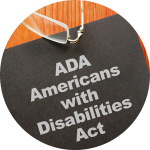What are Reasonable Accommodations?
“An accommodation is any change in the work environment or in the way things are customarily done that enables an individual with a disability to enjoy equal employment opportunities”
Examples
- Modifying work schedule (e.g., flex time, telecommuting)
- Modifying work space (e.g., moving offices, new chair)
- Using technology (e.g., alarm, smartphone)
- Change in policy (e.g., allowing more breaks)
- Shifting non-essential job duties to other employees
- Moving to a vacant position, if one is available
When does the ADA apply?
During all phases of employment, including:
- recruitment
- pay and benefits
- hiring and firing
- promotions
- job assignments
- training
- leave
- lay-off
- all other employment-related activities
Do employers have to provide reasonable accommodations to eligible employees?
Yes, unless they can show it would be an undue hardship.



